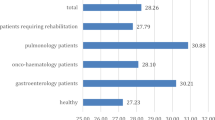Abstract
This study concerns the psychosocial aspects of treatment for chronically ill children. The English-speaking parents of 44 children 5–13 years of age being seen at five specialty clinics at a large county hospital in Los Angeles, and their attending physicians, were the subjects in this study. The parents were interviewed concerning their expectations for the current visit, and the doctor-patient interaction was tape-recorded. Identical categories of information were abstracted from the tape recording and from a chart review of the patients' medical records. Although parents expected 76% of the psychosocial aspects of care to be covered by the doctor, only one fourth were actually discussed in the visit. These unfulfilled expectations were associated with lower satisfaction with medical care received (r=.47, p<0.01). Finally, while doctors recorded about 80% of discussions of symptoms and physical examinations in the patient's medical record, they recorded only 25% of discussion of psychosocial problems.
Similar content being viewed by others
References
Abdurcahman MB: Parent's understanding of their children's illness.Trop Pediatr Child Health 24333, 1978.
Korsch BM, Gozzi EK, Francis V: Gaps in doctor-patient communication: Doctor-patient interaction and patient satisfaction.Pediatrics 42855–871, 1968.
Stewart MA, Buck CW: Physician's knowledge of and response to patients' problems.Med Care 15578–585, 1977.
Zuckerman AE, Starfield B, Hochreiter C, et al: Validating the content of pediatric outpatient medical records by means of tape recording doctor-patient encounters.Pediatrics 56407–411, 1975.
Querido A:The Efficiency of Medical Care. Stenfert Kroese, 1963.
Boyle C: Difference between patients' and doctors' interpretation of some common medical terms.Br Med J 1286–289, 1970.
Samora J, Saunders L, Larson R: Knowledge about specific diseases in four selected samples.J Health Hum Behav 3176–185, 1962.
Joyce CRB, Caple G, Mason M, et al: Quantitative study of doctor-patient communication.Q J Med 38183–194, 1969.
Ley P, Spelman MA: Communications in an outpatient setting.Br J Soc Clin Psychol 4114–116, 1965.
Ley P, Spelman MA:Communication with Patients. London, Staples Press, 1967.
Francis V, Korsch BM, Morris MJ: Gaps in doctor-patient communication: Patients' response to medical advice.N Engl J Med 280535–540, 1969.
DiMatteo MR: A social psychological analysis of physician-patient rapport: Toward a science of the art of medicine.J Soc Iss 3512, 1979.
Pless IB, Roghmann KJ: Chronic illness and its consequences: Observations based upon three epidemiologic surveys.J Pediatr 79351–359, 1971.
Stewart WH: The unmet needs of children.Pediatrics 39157–160, 1967.
Pless IB, Roghmann KJ, Haggerty RJ: Chronic illness, family functioning, and psychological adjustment: A model for the allocation of preventive mental health services.Int J Epidemiol 1271–277, 1972.
McAnarney ER, Pless IB, Satterwhite B, et al: Psychological problems of children with chronic juvenile arthritis.Pediatrics 53523–528, 1974.
Reddihough DS, Landau L, Jones HS, et al: Asthma: The doctor's failure in communication.North Am Med J 88322, 1978.
Katz ER, Kellerman J, Ridge D, et al: School intervention with pediatric cancer patients.J Pediatr Psychol 272, 1977.
Walters WHG: The influence of environmental factors on encopretic children.Acta Paediatr 43159, 1978.
Voeller KK, Rothenberg MD: Psychosocial aspects of the management of seizures in children.Pediatrics 511072–1082, 1973.
Klein SJD: Chronic kidney disease. Impact on the child and family and strategies for coping.Dissertation Abstracts Int 36:5580-A, 1976.
Blom BE: The reactions of hospitalized children to illness.Pediatrics 42590, 1968.
Mahaffy PR Jr: The effects of hospitalization on children admitted for tonsillectomy and adenoidectomy.Nurs Res 1412–19, 1965.
Mattsson A: Long-term physical illness in childhood: A challenge to psychosocial adaptation.Pediatrics 50801–811, 1972.
Pless IB, Pinkerton P:Chronic Childhood Disorder: Promoting Patterns of Adjustment. Chicago, Year Book Medical Publishers, Inc., 1975.
Satterwhite BB: Impact of chronic illness on child and family: An overview based on five surveys with implications for management.Int J Rehabil Res 17, 1978.
Tavormina JB, Kastner LS, Slater PM, et al: Chronically ill children: A psychologically and emotionally deviant population?J Abnorm Child Psychol 499–110, 1976.
Pless IB, Satterwhite BB: Chronic illness. In RJ Haggerty, KJ Roghmann, IB Pless (eds):Child Health and the Community. New York, Wiley, 1975.
Feinstein AR, Taube H, Cavalieri R, et al: Physical activities and rheumatic heart disease in asymptomatic patients.JAMA 1801028–1031, 1962.
Breslau N, Haug MR, Burns AE, et al: Comprehensive pediatric care: The patient's viewpoint.Med Care 13562–569, 1975.
Chamberlin RW, Jr: Social data in evaluation of the pediatric patient: Deficits in outpatient records.J Pediatr 78111–116, 1971.
Romm FJ, Putnam SM: The validity of the medical record.Med Care 31310–315, 1981.
Osborne CE, et al: Criteria for evaluation of ambulatory child health care by chart audit: Development and testing of a methodology. Final report of the Joint Committee on Quality Assurance of Ambulatory Health Care for Children and Youths.Pediatrics 56(4 Pt 2 Suppl):625–692, 1975.
Ware JE Jr, Snyder MIC, Wright WR: Development and validation of scales to measure patient satisfaction with health care services: Volume I of a Final Report. Publication No. PB-288-328. Springfield, Virginia, National Technical Information Service, 1976.
Additional information
Dr. Lau is Assistant Professor of Social Psychology, Carnegie-Mellon University, Pittsburgh, Pennsylvania. Dr. Williams is Assistant Clinical Professor of Pediatrics, University of South Dakota School of Medicine, Mitchell, South Dakota. Ms. Williams is with the University of California, Los Angeles. Dr. Ware is Senior Social Scientist, The Rand Corporation, Santa Monica, California. Dr. Brook is Professor of Medicine and Public Health, UCLA Center for the Health Sciences, Los Angeles. Preparation of this article was assisted by a grant from The Robert Wood Johnson Foundation, Princeton, New Jersey. The opinions, conclusions, and proposals in the text are those of the authors and do not necessarily represent the views of The Robert Wood Johnson foundation.
Rights and permissions
About this article
Cite this article
Lau, R.R., Williams, H.S., Williams, L.C. et al. Psychosocial problems in chronically ill children. J Community Health 7, 250–261 (1982). https://doi.org/10.1007/BF01318958
Issue Date:
DOI: https://doi.org/10.1007/BF01318958




